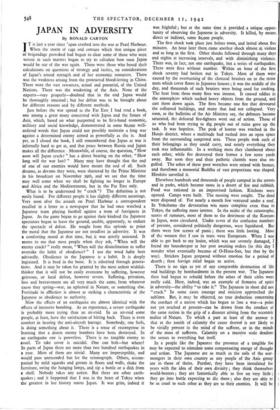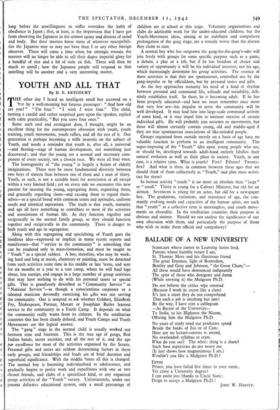JAPAN IN ADVERSITY
By RONALD CARTON T is just a year since van crashed into the war at Pearl Harbour.
When the storm of rage and censure which that unique piece of brigandage provoked had begun to clear some of those who were versed in such matters began to try to calculate how soon Japan would be out of the war again. There were those who based their calculations on questions of strategy and tactics, on considerations of Japan's armed strength and of her economic resources. There was the weakness arising from the protracted blood-letting in China. There were the vast resources, actual and potential, of the United Nations. There was the weakening of the Axis. None of the experts—very properly—doubted that in the end Japan would be thoroughly smashed ; but her defeat was to be brought about for different reasons and by different methods.
Just before the war spread to the Far East I had read a book, one among a great many concerned with Japan and the future of Asia, which, based on what purported to be first-hand economic, military and social knowledge, demonstrated in some 8o,000 well- ordered words that Japan could not possibly maintain a long war against a determined enemy armed as powerfully as she is. And yet, as I closed the book, I still remembered that Japan at war is infernally hard to get at, and that peace between Russia and Japan makes all the difference. Meanwhile, of course, the question, "How soon will Japan crack?" has a direct bearing on the other, "How long will the war last?" Many may have thought that the end of one of our enemies would have meant the end of all. Such dreams, as dreams they were, were shattered by the Prime Minister in his broadcast on November 29th, and we see that the time may well come when we shall be fighting no longer in Europe and Africa and the Mediterranean, but in the Far East only.
What is to be understood by " crack "? The definition is not easily found. For different people it has slightly different meanings. Very soon after the assault on Pearl Harbour a correspondent recalled in a letter to a newspaper that he had once watched a Japanese team playing football against a team of foreigners in Japan. As the game began to go against their kindred the Japanese spectators began to leave the ground, unable, apparently, to endure the spectacle of defeat. He sought from this episode to point the moral that the Japanese are not steadfast in adversity. It was a comforting moral at that time, but, it was utterly unsound. It seems to me that most people when they ask, "When will the enemy crack?" really mean, "When will the disinclination to suffer overtake the habit of obedience?" I use the word habit here advisedly. Obedience in the Japanese is a habit. It is deeply ingrained. It is bred in the bone. It is inherited through genera- tions. And it may be taken for granted by the most ardent wishful- thinker that it will not be easily overcome by suffering, however grievous, or local defeat, however severe. Suffering, privation, loss and bereavement are all very much the same, from whatever cause they spring—war, an upheaval in Nature, or something else. Fortitude in affliction is almost as striking a characteristic of the Japanese as obedience to authority.
N'ow the effects of an earthquake are almost identical with the
effects of intensive bombing. As an experience, a severe earthquake is probably more trying than an air-raid. In an air-raid some people, at least, have the satisfaction of hitting back. There is even comfort in hearing the anti-aircraft barrage. Somebody, one feels, is doing something about it. There is a sense of recompense in learning that a dozen enemy bombers have been destroyed. In an earthquake one is powerless. There is no tangible enemy to assail. To take cover is suicidal. One can bolt—but where? In parts of Japan there are more than two hundred earthquakes in a year. Most of them are trivial. Many are imperceptible, and would pass unrecorded but for the seismograph. Others, accom- panied by mild squeaks and groans in floors and walls, shake the furniture, swing the hanging lamps, and tip a bottle or a dish from a shelf. Nobody takes any notice. But there are other earth- quakes ; and it happened that I was in the heart of Tokyo when the greatest in her history smote Japan. It was grim, indeed it
was frightful ; but at the same time it provided a unique oppor- tunity of observing the Japanese in adversity. It killed, by means direct or indirect, some 8o,000 people.
The first shock took place just before noon, and lasted about five minutes. An hour later there, came another shock almost ds violent and as long as the first. Other shocks followed through many days and nights at increasing intervals, and with diminishing violence. There was, in fact, not one earthquake, but a series of earthquakes.
There were fires without number. Within an hour of the first shock seventy had broken out in Tokyo. Most of them were caused by the overturning of the charcoal braziers on to the straw mats which cover floors in Japanese houses ; it was the middle of the day, and thousands of such braziers were being used for cooking. The heat from these many fires was intense. It caused eddies in the atmosphere which sucked heavy objects from the ground, and cast them down again. The fires became one fire that devoured the collapsed buildings, and many that had not collapsed. Very soon, as the bulletins of the Air Ministry say, the defences became saturated, the defeated fire-fighters went out of action. Those of us who had been trying to dig people out of ruins gave up the task. It was hopeless. The peak of horror was reached in the Honjo district, where a multitude had rushed into an open space from the surrounding congested area. These people took such of their belongings as they could carry, and nearly everything they took was inflammable. In a seething mass they clambered about each other, while fire destroyed their homes a few score yards away. But soon they and their pathetic chattels were also en- gulfed. The ashes of these poor wretches were mixed with bronze, and therefrom a memorial Buddha of vast proportions was shaped. Hirohito unveiled it.
Elsewhere hundred's and thousands of people tamped in the streets and in parks, which became oases in a desert of fire and rubbish. Food was rationed in an improvised fashion. Kitchens were opened. Camps were built. The missing were sought. The dead were disposed of. For nearly a month few ventured under a roof. In Yokohama the devastation was more complete even than in Tokyo, the suffering more intense. In the midst of the catastrophe, scores of rumours, most of them to the detriment of the Koreans in Japan, were circulated. Under cover of the confusion numbers of persons, considered politically dangerous, were liquidated. But • there were few scenes of panic ; there was little looting. Most of the women that I saw in tears were Europeans. When I was able to get back to my house, which was not severely damaged, I found my housekeeper at her post awaiting orders (to this day I wonder what eventually became of O-Hana-San, but that by the way). Stricken Japan prepared without emotion for a period of dearth ; then foreign relief began to arrive.
There is no sign as yet of any comparable destruction of life and buildings by bombardment in the present war. The Japanese then had begun to rebuild before the ashes of their cities were really cold. Here, indeed, was an example of thinness of spirit in adversity—the ability "to take it." The Japanese in short did not "crack." In some cases courage and stoicism approached the sublime. But, it. may be objected, no true deduction concerning
the conduct of a nation which has begun to lose a war—a point not yet reached at present,--can be drawn from the conduct of
the same nation in the grip of a disaster arising from the 'eccentric malice of Nature. To which a part at least of the answer is that 'at the zenith of calamity the cause thereof is not likely to be vividly present in the mind of the sufferer, or in the minds of the mass of sufferers. Calamity on a massive scale deadens the senses to everything but itself.
In a people like the Japanese the presence of a tangible foe may be expected to stimulate some compensating energy of thought and action. The Japanese are as much in the toils of the war- mongers in their own country as any people of the Axis group are in those of theirs. Further, they have been inoculated for
years with the idea of their own divinity ; they think themselves world-beaters ; they are fantastically able to live on very little ; they go• into battle expecting to die there ; also they are able to be as cruel to each other as they are to their enemies. It will be
long before the unwillingness to suffer overtakes the habit of obedience in Japan ; that, at least, is the impression that I have got from observing the Japanese in the utmost agony and distress of mind and body. But their masters know more of whatever susceptibili- ties the Japanese may or may not have than I or any other foreign observer. There will come a time when for strategic reasons the masters will no longer be able to sell their dupes imperial glory for a handful of rice and a bit of stale tai fish. There will then be much to untell ; how the Japanese people will respond to that =telling will be another and a very interesting matter.



























 Previous page
Previous page